ZeroWater is a relatively new water filter system that promises water with zero dissolved solids. Does it live up to the task? Find our below.
Zero Dissolved Solids Filter
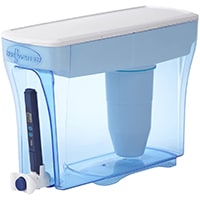
ZeroWater Filter
The ZeroWater filter claims to reduce TDS (total dissolved solids) in your water all the way to zero; in our tests it did exactly that. We tested it against some of the hardest water in the US in Phoenix, Arizona. Even with starting values in the 500 ppm range the ZeroWater filter was able to reduce TDS to zero. The water was almost shockingly pure tasting. Honestly, I’m so used to drinking high TDS water that it will take time to get used to. Arguably the best water filter currently on the market.Check PricePros:
- Great performance at removing TDS (total dissolved solids), in all of our tests it did indeed hit a TDS of 0
- Water is extraordinarily pure of anything except water
- TDS performance relative to other common filters was night and day. PUR and Brita struggled to remove even 30% of TDS in our test water (Phoenix, AZ source). See our Brita vs. PUR vs. ZeroWater comparison.
Cons:
- Slower filtration speed due to the 5-stage system, filters about 0.8 cups every minute.
- May remove good minerals naturally found in water during the filtration process
If you would rather watch a video instead of reading, we’ve got our complete ZeroWater video review here:
ZeroWater Design
The ZeroWater system is designed to purify water by effectively reducing the number of total dissolved solids. The water filter installs into a variety of different pitcher sizes—from 6-cup to 40-cup capacities.
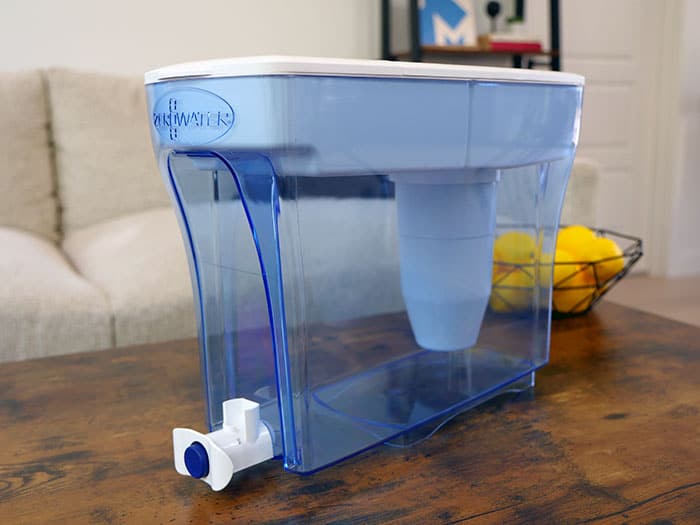
No matter which pitcher size you select, all ZeroWater systems come with the same 5-stage filter.
5-Stage Filter
This filter uses a 5-stage system that removes particulate through a series of filtrations. Although you can’t see many of these layers on the outside, the 5 stages are listed below.
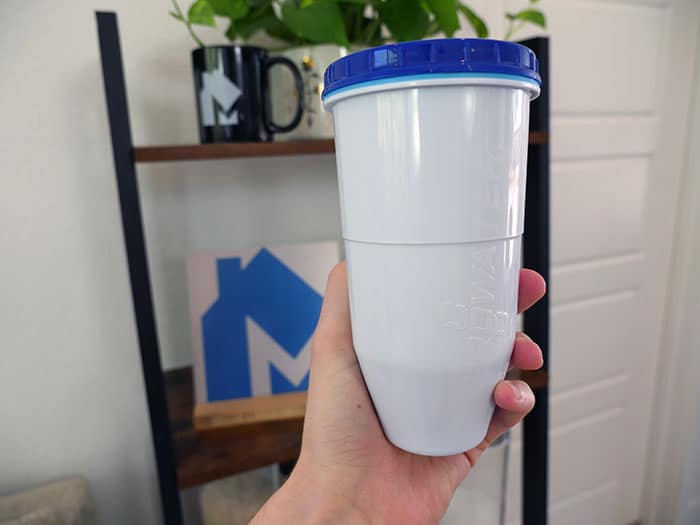
- Coarse filter screen: captures fine particles and sediment
- Foam distributer: disperses water evenly across the entire width of the filter for more effective filtration
- Carbon filter: filters out additional contaminants and helps improve taste; also includes an oxidation alloy for removing chlorine and other heavy metals
- Ion exchange resin: a bed of resin towards the bottom of the filter for removing foreign ions from the water
- Fine screen: includes a screen and non-woven membrane layer to remove ultra-fine particles
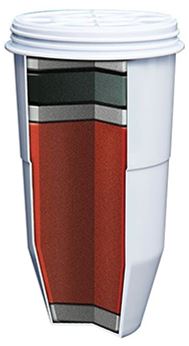
How does it work?
Pour water from the sink or any tap into the top of the pitcher. As the water travels through the filter, it moves from the top reservoir of unclean water down into the lower reservoir of clean water, ready for drinking.
Due to the 5-stage filter, filtration may take longer with the ZeroWater system than comparable other systems (like Pur or Brita).
In our tests it took the ZeroWater filter 6 minutes to filter 5 cups of water. That’s a rate of about 0.8 cups / minute.
What contaminant does it remove?
ZeroWater is rated to remove up to 95% of contaminant and impurities. The results below were independently derived from ZeroWater, in accordance to the EPA drinking water standards.
MORE: Click here to learn more about how ZeroWater is tested.
Average Reduction of Listed METAL Contaminants
- Antimony: 97%
- Arsenic (+3): 83%
- Arsenic (+5): 93%
- Asbestos: 97%
- Barium: 98%
- Cadmium: 99.9%
- Chromium 3: 81%
- Chromium 6: 99.9%
- Copper: 99%
- Cobalt: 99%
- Iron: 98%
- Lead: 97%
- Manganese: 98%
- Mercury: 96%
- Selenium: 98%
- Silver: 81%
- Thallium: 99%
- Uranium: 99%
- Zinc: 98%
Average Reduction of Listed Inorganic Contaminants
- Chlorine: 95%
- Cyanide: 31%
- Flouride: 41%
- Nitrate: 74%
- Nitrite: 81%
- Sulfide: 55%
What’s in the box?
The ZeroWater filtration system comes with the follow:
- Pitcher / Tank (varies by model)
- Electronic TDS water testing meter
- Filter cartridge

Performance
To test the performance of the ZeroWater filter, same as all of our water filter tests, we use two methods.
- TDS test: tests the number of “total dissolved solids”
- Taste test: uses a small group of individuals to blindly taste the water and provide a score based on taste alone
TDS Test
This test uses a TDS meter to evaluate the number of “total dissolved solids” that are found in the water.
ZeroWater encourages consumers to put the water to the test and even includes a TDS meter for free with the purchase of a filter + pitcher combo.
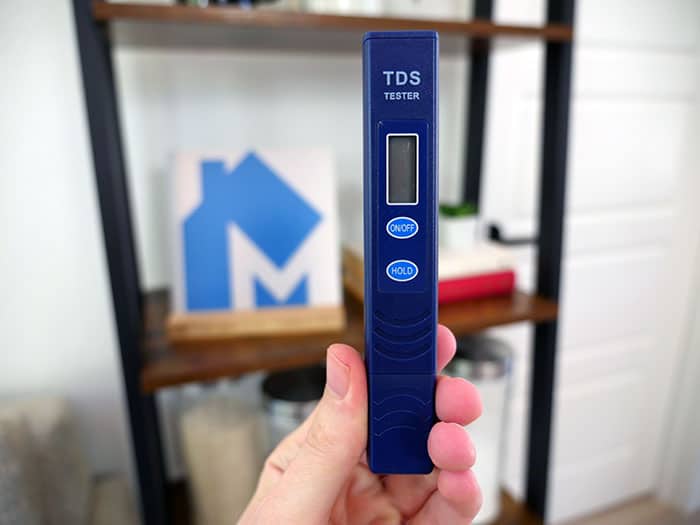
What are dissolved solids?
Dissolved solids basically boil down anything extra in the water. Under this measuring method, a score of 0 would represent the purest water you can get. Anything higher than that would mean that there are still contaminant, chemicals, or other additives in the water that contribute to the overall score.
NOTE: Dissolved solids are not always bad. Sometimes solids are added to improve taste or many includes naturally occuring minerals.
Saltwater, for example, can be natural and pure, but the salinity in the water alone would increase its TDS score.
Mineral water also would have a high TDS level.
Water filters struggle to tell the difference between good solid and bad solids so ZeroWater takes it all out.
Results
Overall, the performance of the ZeroWater filter was exceptional. It reduced all TDS down to 0 for all of our performance tests.
For comparison, I’ve dropped in a side by side of Pur vs. Brita as well. Below is a before and after for TDS for each filter.
ZeroWater

- Before: 542 ppm
- After: 0 ppm
PUR
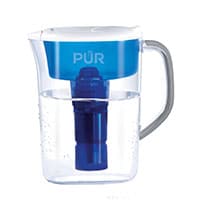
- Before: 542 ppm
- After: 511 ppm
Brita
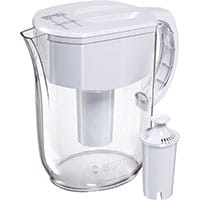
- Before: 542 ppm
- After: 396 ppm
The source for our water test was city water from Phoenix, Arizona. Arizona has some of the highest TDS water in the country, making our test extremely difficult on all purifiers we tested.
ZeroWater released the following water level TDS by state.

RELATED: Click here to read the full review of PUR vs. Brita comparison.
Taste Test
In addition to our TDS test, we also completed a short taste test. For our taste test we used Modern Castle team members as well as a small group of our friends / family.
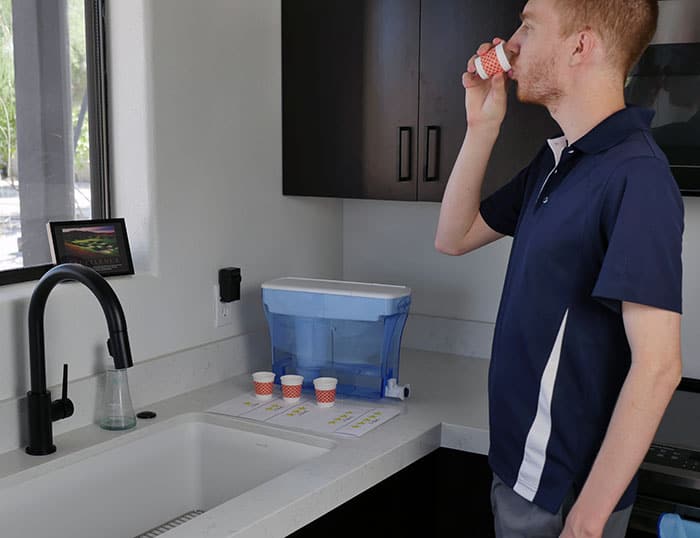
Here’s how we did our taste test:
- We poured 3 types of water into 3 paper cups
- Types of water included filtered ZeroWater, filted PUR water, and filtered Brita water.
- Testers tried each of the 3 water types
- We then asked testers to rate the water on a 1-5 scale, with 5 being the best
- Finally, we then created an average score based on those ratings
Taste Test Results
Our results were definitely surprising. The scores are below.
ZeroWater
60%
PUR
69%
Brita
83%
On average, our testers rated the ZeroWater at a 60% out of 100%. PUR and Brita were preferred when it comes to taste, earning a 69% and 83%, respectively.
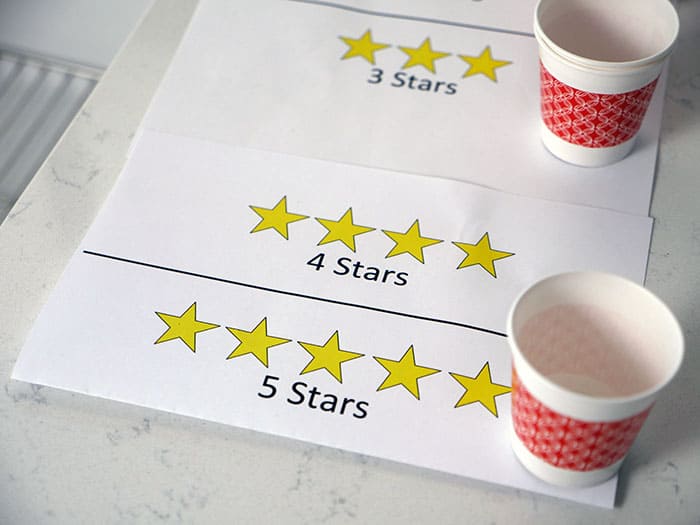
One of our taste testers said this about the ZeroWater:
“I can tell it’s pure, but I just don’t like the taste.”
Taste Tester
While I personally felt that the taste was fine, I will say that the taste is shocking. The ZeroWater removes everything…bad solids, good solids, and everything in between. As a result, the water tastes very different from any other water I’m used to.
Our water source is Phoenix, Arizona, some of the hardest and highest TDS water in the country. Most filters can only reduce TDS by 20-30% for Phoenix water, which still puts it in the 300-400 range, even in the best of cases.

Completely eliminating the dissolved solids gives it a unique and surprising taste.
I wouldn’t say it’s bad, only that it’s different. In my view, that difference is what’s so shocking to many testers. I think a lot of people would find it weird tasting, while others will absolutely love it. But it really will be a personal preference.
The Pitchers
There are quite a few pitchers you can get for the ZeroWater filter, depending on your needs.

Current available sizes include:
- 6-cup pitcher
- 10-cup pitcher
- 18-cup pitcher
- 23-cup pitcher
- 40-cup tank
Maintenance
Maintaining this water filter mainly includes replacing the filter as needed. Other than that, simply use the filter as often as want to drink water, and replace as needed.
When is it time to replace the filter?
The length of time your fitler will last is dependant on the initial TDS score of your unfiltered water. Water that requires more filtration means that the fitler will not last as long.
Here’s how many liters of water you can expect from each TDS level:
| Tap Water TDS | Contaminant Level | Description | Expected Quantity of ZeroWater per Filter |
|---|---|---|---|
| 000-001 | Meets FDA standards of purified bottled water | No known municipalities | N/A |
| 002-050 | Moderate | Naturally occurring in only a few cities | 150 liters or more |
| 051-200 | Typical | Average for most homes | 95 - 150 liters |
| 201-300 | High | Higher number of contaminants means slightly lower capacity | 55 - 95 liters |
| 301-400 | Exceptionally High | Shorter filter life than expected | 30 - 55 liters |
| 401+ | Extreme | Very short filter life | 30 liters or less |
The manufacturer recommends changing the filter when the TDS meter reads “006” or higher. Allowing the filter to be used beyond that point may result in a difference in the water’s taste or smell.
How to replace the filter?
To replace the filter, simply unscrew it from the base of the pitcher (may vary based on the model) and screw in a new filter.

REPLACE: You can find ZeroWater replacement filters here or click here to check the price for third-party replacement filters.
Should you buy the ZeroWater filter?
On the fence about if the ZeroWater system is right for you?
I would recommend this system if you’re looking for the following:
- Maximum removal of total dissolved solids: During our performance tests, this filter removed 100% of dissolved solids every time. It is massively better at removing solids compared to more traditional filters like PUR and Brita, which achieved TDS scores of 511 and 396, respectively, in our tests.
- Want 5-stage filtration: Many conventional filtration system uses a 2-stage system, but ZeroWater prides itself on the 5-stage system.
- You’re okay getting used to the new taste: Because ZeroWater removes so many of the dissolved solids it gives the taste a surprising and different taste. Be prepared for the new taste and realize it might take some time to get used to.
Click here to learn more or to buy the ZeroWater filtration system.
Updates
- June 12, 2020 – Updated test taste data was published. The new expanded taste tests saw an improvement to Zero’s taste test score, from a 46% to a 60%. However, Zero is still behind PUR and Brita’s taste test, which earned a 69% and 83%, respectively. Zero’s review score was not altered.
- June 3, 2020 – Initial version of the page was published.
Extraordinary Purificatio
-
Design - 98%
98%
-
Performance - 100%
100%
-
Quality - 95%
95%
-
Usability - 95%
95%
-
Value - 98%
98%
Summary
The ZeroWater filter uses a 5-stage filter to remove 100% of dissolved solids from water. Removes and reduces a litany of common metal, inorganic, and other particulates from water, including lead, mercury, asbestos, among others. It our tests it was able to reduce a high TDS water source from 542 ppm to 0 ppm. It lacks so many particulates that the water’s taste is surprising (so much so that it took me a while to get used to it). Overall, an extraordinarily high performance water filter, especially at this price point.

